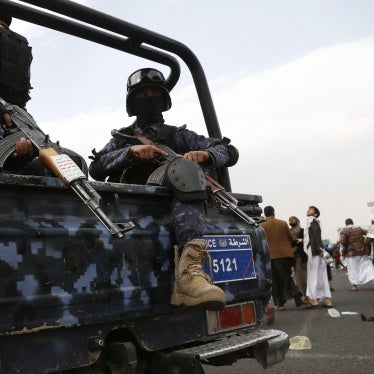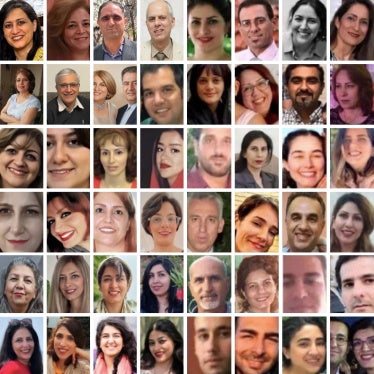September 13, 2012
Dear Members of the Tunisian National Constituent Assembly,
Human Rights Watch, an independent, nongovernmental organization, is writing to urge you to amend those articles of the draft constitution made public by the National Constituent Assembly on August 8, 2012 that undermine human rights, including freedom of expression, women’s rights, the principle of non-discrimination and freedom of thought and conscience.
The draft constitution upholds many key civil, political, social, economic and cultural rights. These include articles on the right not to be detained arbitrarily, the right to bodily integrity, a prohibition of torture and the illegality of statutes of limitation for this crime; freedom to create political parties; freedom of movement; freedom to assemble and associate, a right to citizenship; the rights of persons who have been accused of breaking the law, arrested, or detained; and the right to work, health and education.
In addition, the draftconstitution provides for the creation of a constitutional court that will be in charge of ensuring that Tunisian laws are in harmony with the constitution. A positive aspect of this provision is that it will allow individuals to challenge the constitutionality of laws on the occasion of disputes before courts under conditions to be set out by law and to challenge final judgments on the grounds that they are contrary to the rights and freedoms guaranteed by the constitution.
At the same time, the draft constitution also contains several articles that are incompatible with Tunisia’s international treaty obligations on human rights and that would undermine rights protections.
The draft constitution is unclear about whether international human rights treaties that have been duly ratified by Tunisia, including UN and African treaties and protocols, apply directly as law in Tunisia or that they have supremacy over domestic law. While article 38 seems to answer affirmatively by stipulating that “international conventions promulgated by the president of the Republic and ratified by the parliament have supremacy over domestic law”, article 17seems to contradict this by stating, “respect for international conventions is compulsory if they do not contravene this constitution.” This provision is inconsistent with the Vienna Convention on the Law of Treaties, ratified by Tunisia, which states in article 27 that a “party may not invoke the provisions of its internal law as justification for its failure to perform a treaty,” meaning that Tunisia has the duty to ensure that its constitution and laws comply with its international obligations.The ambiguous formulation of article 17 might lead judges and legislators to ignore Tunisia’s international obligations on the basis that they contradict the constitution.
The key shortcomings in human rights protections in the draft constitution concern freedom of expression, freedom of thought and belief, equality between men and women and non-discrimination.
Article 26 of the draft constitution provides that freedom of opinion, expression, information and creation is guaranteed and can be limited only be laws designed to protect the rights of others, their reputation, security and health. However, draft article 3 threatens freedom of expression by stipulating that “The State guarantees freedom of belief and religious practice and criminalizes all attacks on the sacred.” This provision, which defines neither what is “sacred” nor what constitutes an “attack” on it, opens the door to laws that criminalize speech.
While international norms of freedom of expression allow governments to restrict speech that directly incites to religious or racial hatred, they do not allow restrictions on the sole basis that members of one or more social, national, or confessional group deems the speech to be offensive to their beliefs. To create a constitutional principle that “attacks” on “the sacred” are to be criminalized will likely pave the way to punishing peaceful expression of dissenting or nonconformist views on religion.
The UN Human Rights Council, made up of countries from across the globe, in its key resolution 16/18 of March 2011, agreed by consensus to drop any notion of defamation of religion as a permissible limitation to free expression.
In addition to criminalizing speech that offends religion, the draft constitution contains another article criminalizing any form of “normalization” with “Zionism and the Zionist state.” This article, which does not define “normalization” as it can be carried out by individuals, could lead to far-reaching restrictions on speech, such as peaceful advocacy of diplomatic relations with Israel, and on freedom of association by, for example, repressing individual contacts with Israeli citizens or organizations.While a State can prohibit its citizens from having certain types of contacts with another State, criminalizing normalization with “Zionism” gives the authorities a wide discretion to prosecute its citizens on the basis of vaguely worded provisions.
-
Freedom of thought and religion
The formulation in article 3 of the draft constitution that “The State guarantees freedom of belief and religious practice” omits the broader concepts of freedom of thought and of conscience, which more clearly encompass the right to replace one’s religion with another or to embrace atheism. Given that many Tunisian scholars support the criminalization of apostasy – the repudiation by an individual of his or her Islamic faith – human rights would be best protected by a guarantee in the constitution of a right to change one’s religion or have no religion.
The International Covenant on Civil and Political Rights classifies freedom of thought, conscience and religion together. United Nations Human Rights Committee has held that article 18 of the ICCPR encompasses freedom of thought on all matters such as personal conviction and the commitment to religion or belief. In addition, the Committee states “that this freedom to "have or to adopt" a religion or belief necessarily entails (…) the right to replace one's current religion or belief with another or to adopt atheistic views, as well as the right to retain one's religion or belief.”
Article 28 of the draft constitution provides that: “The state guarantees the protection of women’s rights and supports their advances, considering them as men’s partners in building the nation, and their roles within the family complement each other. The state guarantees equal opportunity between men and women to assume various responsibilities. The state guarantees the elimination of all forms of violence against women.” Invoking notions of gender roles that are complementary, the draft constitution risks diluting the principle of equality between men and women as required by article 2 of the Convention on the Elimination of All Forms of Discrimination against Women (CEDAW), ratified by Tunisia in 1985. It may also run counter to article 5(a) of CEDAW, which requires states to “modify the social and cultural patterns of conduct of men and women, with a view to achieving the elimination of prejudices and customary and all other practices which are based on the idea of the inferiority or the superiority of either of the sexes or on stereotyped roles for men and women.”
The CEDAW committee responsible for monitoring and interpreting the treaty has recognized that complementarity is a lesser standard than full equality and on that basis encourages state to eliminate all forms of discrimination against women and ensure equality between men and women.
Tunisia lifted its reservations to the CEDAW in August 2011. However, in doing so, Tunisia’s interim authorities kept a general declaration that Tunisia “shall not take any organizational or legislative decision in conformity with the requirements of this Convention where such a decision would conflict with the provisions of Chapter One of the Tunisian Constitution.” Chapter One establishes that Tunisia is a state whose religion is Islam.
-
Equality rights and non-discrimination
Article 22 of the draft constitution states that “all citizens are equal in rights and freedoms before the law, without discrimination of any kind.” This provision is, however, contradicted by the article of the draft constitution that states that only a Muslim can become president of the republic.
Recommendations
In order to safeguard human rights in the constitution and eliminate the threats to those rights in the draft currently before it, Human Rights Watch urges the NCA to revise the draft to:
-
Include a general clause in the constitution directly incorporating into Tunisian law human rights as defined by international treaties ratified by Tunisia, including the International Covenant on Civil and Political Rights, the International Covenant on Economic, Social and Cultural Rights and the African Charter on Human and People’s Rights. Such treaties should have clear supremacy over domestic law. The NCA should also include a clause stating that the rights and freedoms set out in the constitution bind the legislature, the executive, the judiciary and all the organs of state. It could also include a clause that judges should interpret the law, including the constitution, in a way that is consistent with international human rights law.
-
Include an affirmation that the right to freedom of religion, thought and conscience encompasses the freedom to change religion or belief and to practice in public and in private any religion through worship, observance and customs, or to practice no religion.
-
Eliminate provisions related to criminalization of offenses where these offenses can easily include protected, peaceful speech. These provisions include the broadly worded requirement to criminalize attacks on sacred values, and the prohibition of normalization with Zionism or Israel.
-
Remove the mention of complementarity, a concept which can entrench discriminatory legislation against women.
-
Eliminate the draft provision that discriminates among citizens by requiring that the President of the Republic be a Muslim.
You have included many positive provisions in the constitution affirming rights that Tunisians have long been denied. We urge you to remove the existing major loopholes that will allow the authorities to confiscate those rights at will.
We thank you for your time and attention.
Sincerely,
Sarah Leah Whitson
Executive Director
Middle East and North Africa Division
Human Rights Watch








